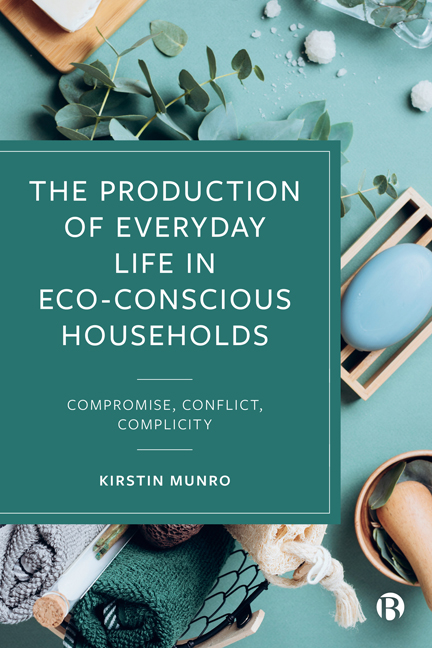Book contents
- Frontmatter
- Dedication
- Contents
- Acknowledgments
- 1 Introduction: “This Can’t Be All Up to Me”
- 2 Eco-Conscious Household Production and Capitalist Society
- 3 Priorities in Eco-Conscious Households
- 4 Resources and Constraints in Eco-Conscious Households
- 5 Managing Household Waste
- 6 Cleanliness and Comfort
- 7 Doing Their Own Research
- 8 Conflict
- 9 “How Do We Live with Ourselves?”
- 10 Conclusion: “We Have Met the Enemy and He Is Us”
- Notes
- Index
8 - Conflict
Published online by Cambridge University Press: 18 January 2024
- Frontmatter
- Dedication
- Contents
- Acknowledgments
- 1 Introduction: “This Can’t Be All Up to Me”
- 2 Eco-Conscious Household Production and Capitalist Society
- 3 Priorities in Eco-Conscious Households
- 4 Resources and Constraints in Eco-Conscious Households
- 5 Managing Household Waste
- 6 Cleanliness and Comfort
- 7 Doing Their Own Research
- 8 Conflict
- 9 “How Do We Live with Ourselves?”
- 10 Conclusion: “We Have Met the Enemy and He Is Us”
- Notes
- Index
Summary
Conflicts due to differences in preferences, priorities, and the social meanings associated with mundane practices within households are the premise of countless television sitcoms—between parents and their adult children in Absolutely Fabulous, Frasier, and Steptoe and Son; between parents and their children in The Simpsons, Family Ties, Out of this World, and King of the Hill; between spouses in Bewitched, I Love Lucy, Dharma & Greg, and Keeping up Appearances; between nonrelated adults living together, as in Mr. Belvedere, The Nanny, Who's the Boss, Father Ted, and Perfect Strangers. In each of these cases, these differences are exploited for comedic effect. In the 1963 Steptoe and Son episode “The Bath,” the more fastidious and forward-looking adult son Harold explains to his rag-and-bone-man father Albert—who seems trapped in the late 19th century—that their current arrangement of bathing infrequently in a metal basin in the front room is no longer acceptable: “A lot of people don't live like that anymore … Those days is gone. It's a social stigma these days. You might as well have a horse sitting in the armchair and be done with it.” Harold interprets his father's bathing practices as acts of “extreme dirtiness”—a meaning not shared by Albert.
Each of the households I spoke with for this book have their own unique combinations of environmental priorities, resources, and constraints—described in detail in Chapters 3 and 4—and conflict often arises both within and across households when these differences clash and compromise proves difficult. Chasms between the social meaning of practices can be too large to cross, particularly for these household members who are outside the “mainstream” and for whom the environmental stakes of mundane practices feel high. My informants often laughed—sometimes nervously—when they revealed these conflicts to me. While these sorts of interpersonal conflicts were generally conveyed in a lighthearted and affectionate manner, these differences are a real source of tension and stress, and at times have the potential to harm household members’ physical or emotional well-being.
Interpersonal conflict in households where priorities and the social meaning of practices clash is relatable—this is perhaps why these culture clashes and fish-out-of-water household scenarios are such persistent themes in television sitcoms.
- Type
- Chapter
- Information
- The Production of Everyday Life in Eco-Conscious HouseholdsCompromise, Conflict, Complicity, pp. 137 - 155Publisher: Bristol University PressPrint publication year: 2023

